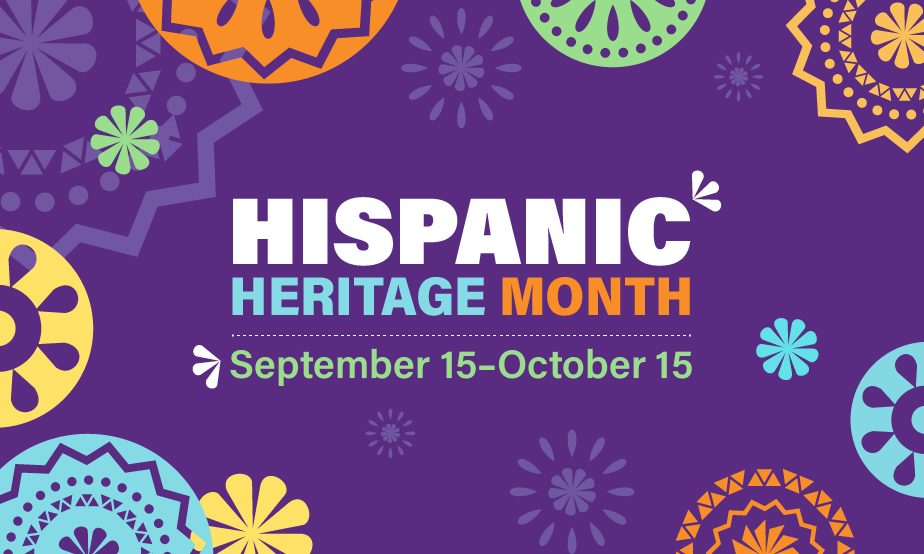Throughout Hispanic Heritage Month, Austin Community College District (ACC) asks inspiring and accomplished faculty and staff about their culture and what Hispanic Heritage Month means to them. Scroll down for additional profiles.
Visit ACC’s 2021 Hispanic Heritage Month website for a list of events happening throughout the month and a message board to share your thoughts.
Lt. Jessica Horta-Perez
Lieutenant Jessica Horta-Perez made history at the college by becoming the first female Hispanic Lieutenant with the ACC Police Department.
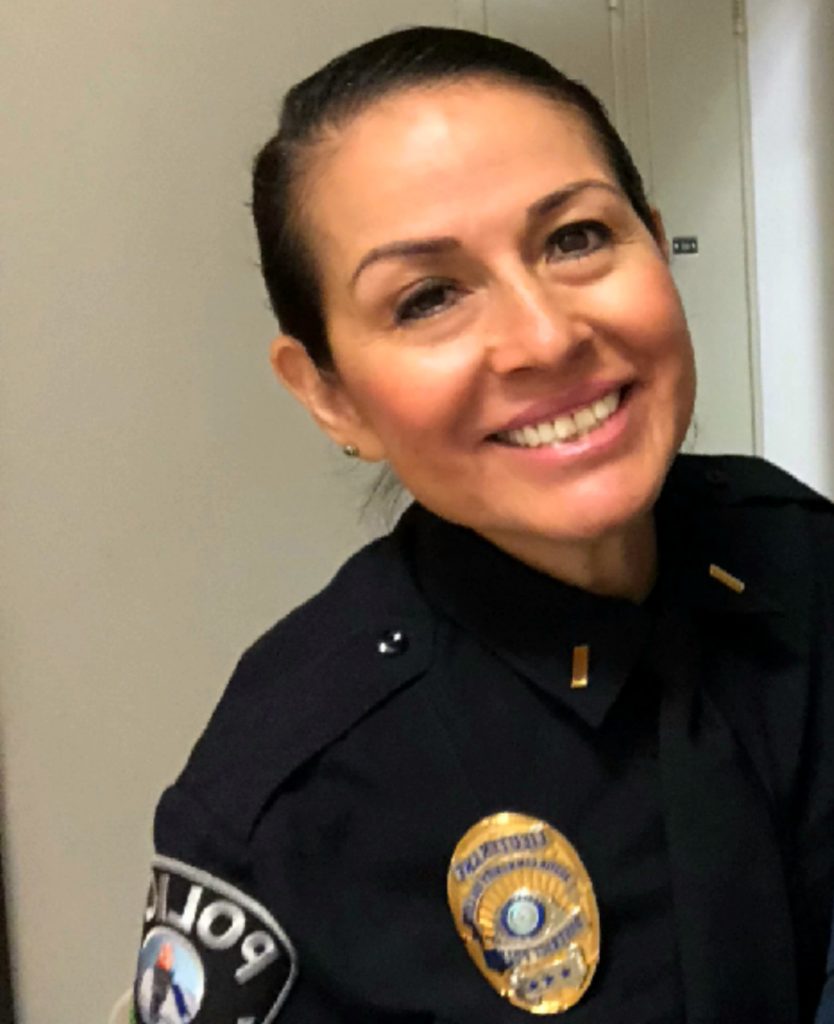
What do you admire most about Hispanic culture?
Centers such as the Emma S. Barrientos Mexican American Culture Center (MACC) showcase our heritage while history continues to be made, such as Sonia Maria Sotomayor becoming the first Hispanic, first Latina Associate Justice of the Supreme Court of the United States. I’m delighted that our traditional recipes will continue to carry on. I listen to my nieces and nephews who are eager to learn how to cook homemade Mexican dishes. I love hearing mariachi music play after all these years in the background for family events, fiestas, or just because.
What are some ways you celebrate your heritage?
By supporting music, fashion, and local food establishments. Recently I began incorporating Latin jazz in my everyday work life — listening to the sounds soothes the soul. I try to make it a habit when embarking on a trip — whether in Mexico City or Las Vegas airports — to visit the stores ¡Ay Güey! and Desigual. These are unique Latin business shops that incorporate Latin designers from all walks of life. Feliz Modern is a local colorful store in San Antonio that supports local artists. I’m a foodie at heart. Growing up with the aromas of homemade tortillas, I seek out new and upcoming chefs in the Latin/Hispanic community, indulging in their food trucks, restaurants, and/or taco stands. I recently experienced Suerte, a modern restaurant opened in Austin offering Latin flair cuisine that was featured on the Netflix series “Taco Chronicles.“
What advice would you give to our Hispanic/Latinx students?
The advice I would give to our Hispanic/Latinx students is to truly seek opportunities our community college offers, whether it be financial assistance, academic flexibility, school/life balance, transfer agreements, and/or professional certificates. Introduce yourself to our Latino/Latin American Studies Center “El Centro.” We are here to help you get there.
What is your biggest inspiration?
My biggest inspiration is our ancestors. Without their survival, I would not be where I am today. They have paved the way for the paths we continue to pave. My great-grandparents are a model for this. From ocean travels in Spain to land travels in Mexico, finally arriving in the land of dreams, America. From this, I became the first female Hispanic sergeant, then later the first female Hispanic lieutenant with the Austin Community College District Police Department.
What is your proudest achievement?
The belief is that you can achieve career success from hard work. As the saying goes, “there is light at the end of the tunnel.” My family and I were migrant workers traveling mostly from Michigan to Florida, laboring in asparagus fields and orange groves. I remember in my younger years dreading the time of year when we had to pack up and head north. One sweaty, grubby day blueberry picking, I was conversing with my mother in the field and said something to the effect of “there has to be more to life than this,” and my mother, never missing a beat, responded with: “There is — it is called education, and it doesn’t just end after high school. Educate yourself to have ‘the more’ you want in life.” That was my “a-ha!” moment. My proudest achievement was becoming a first-generation college student, and to be followed by my sister, who continued on to earn her master’s degree.
How do you foster an inclusive environment?
Fostering an inclusive environment begins in your own backyard by establishing a mutual respect for people of all cultural orientations who can freely express who they are. My husband and I have a close circle of diverse friends whose opinions and points of view matter and are valued. Embracing this at home opens the ability to effectively engage with the public. Celebrate everyone’s differences, whether in your personal life, among family and friends, or in the workplace.
Dr. Samuel Echevarria-Cruz
Dr. Samuel Echevarria-Cruz is ACC’s new associate dean of Diversity, Equity, and Inclusion in Instruction. He is also a professor of sociology in the Sociology and Social Work Department. He started at the college as an adjunct professor in 2005 and became a full-time faculty member in 2009.
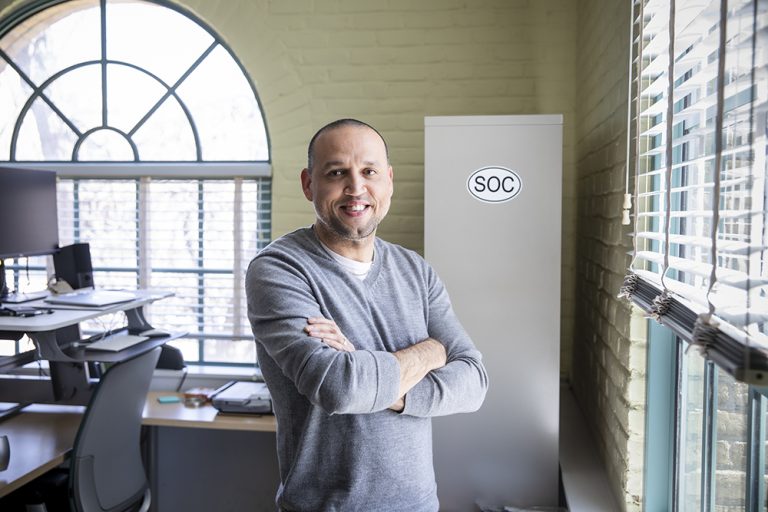
How do you identify with the Hispanic community?
I identify with the Hispanic community through my family and upbringing as a Mexican American border “chavalito” from Brownsville, Texas, and a Nuyorican “nene” from Spanish Harlem, Manhattan, NY. Growing up in both environments fully filled me with joyous memories of the sights, sounds, smells, love, and laughter of both cultures.
What do you admire most about Hispanic culture?
One of the most cherished aspects of Hispanic culture, for me, is the ability to show affection and respect in both the language and within relationships by using family metaphors. I love the fact that as I get older and am being served by a younger generation, I can say “gracias, mija/o” as a way of showing tenderness and respect for their work. Like other cultures, the idea of others being brought into a more intimate relationship by using familial terms is natural and powerful (hermano, primo, tio, etc.). I still get excited when I meet another “Samuel” and can refer to him as “tocayo!” Total strangers with the same first name are brought closer as part of the culture’s way of connecting us whenever possible.
What are some ways you celebrate your heritage?
Obviously, speaking as much Spanish as I can is important, but so is what I listen to (Spanish music like salsa, regueton, and Selena), and the stories I share with my family about what it means to grow up Hispanic. Of course, we try to cook as much Mexican and Puerto Rican food we can at home! I also think it is important to study Latin American history along with the history of Hispanics in the U.S. to understand how we all came to be a part of this society as it now exists. Finally, I celebrate my heritage by highlighting the diversity of the “Hispanic” label. Being of two Hispanic cultures, it’s easy to also see the beauty in the diversity of the entire Hispanic landscape in the U.S. I think this begins and ends with knowing how important our shared indigenous heritage is.
What advice would you give to our Hispanic/Latinx students?
A few things come to mind. First, connect with your culture as best you can because it is one of the most important strengths of who you are! Talk to relatives and friends about their experiences, especially those that grew up in other places. Second, learn more about the history of who we are, both collectively and of the national origin group(s) you are directly related to. Take a Mexican American history class at ACC! Understand what it means to be both “minoritized” in this society even as we are the older culture (indigenous being the first, followed by the culture of “mestizaje”). Lastly, reconnect with what it means to be part of the indigenous culture of this continent. For too many of us, our indigenous roots were suppressed or outright canceled due to prejudice, discrimination, and deep bias. We will never fully be Hispanic if we don’t embrace our full indigenous background, history, and pride.
What is your biggest inspiration?
Three women get this award! My two grandmothers and my mother. My grandmothers lived hard lives, raised many children by themselves, and poured themselves out for their families in two societies (Mexico/Texas and Puerto Rico/NYC). Even through difficult and terrible struggles, they loved all of us grandkids and made sure we were filled with love, joy, pride, and food! But my heroine is my mother. Although also forced to raise us as a single mother, she sacrificed her life but never sacrificed ours, making sure we could read well as very young children, had the resources we needed to survive, and, most importantly, knew intimately that we were loved and very special human beings. At the same time, we saw this young mother fighting injustice and sacrificing for others in the community who had less of a voice. Through her amazing life, she earned a Ph.D., traveled extensively, and worked tirelessly for poor workers throughout the U.S. and Latin America in her many careers. Mi querida mamacita, Doña Gregoria, te amo!
What is your proudest achievement?
It’s hard not to beam with pride at my five sons, as any parent would! Ages 21 down to 7, they represent the fruit of a blessed life with my wife and our entire family. Professionally, I am probably most proud of completing my Ph.D. studies at UT Austin. It was a very difficult time in my life and the program was both hard and, in many ways, very isolating. But with incredible support from mentors and, most importantly, my wife Diane, I completed my Ph.D. (10 years after beginning my graduate program). This journey was also the result of every teacher I ever had who loved me and guided me, from Ms. Cuellar in kindergarten to Ms. Molina in high school calculus class who wouldn’t let me quit when calculus got really hard!
How do you foster an inclusive environment?
The first way is to recognize and verbalize to all present (students, colleagues, etc.) that they are there because of a set of strengths they possess. My job is to connect what I’m doing to their strengths so we can all be successful. Second is to show that everyone comes from a background rich with cultural wealth. This is true for all our Hispanic/Latinx students, who represent a deep, rich, and wise culture that grows from deep, indigenous roots and reaches full bloom in our families and communities. Lastly, I try to get everyone to “dance,” asking them to share about their lives, hopes, fears, and vision.
Dahlia Anzaldua-Torres
Dahlia Anzaldua-Torres is ACC’s College Relations coordinator and is affectionately known as R.B. the Riverbat’s “Mama.” Dahlia started at ACC in 1991 as a technical staff assistant in the Department of Planning and Development.
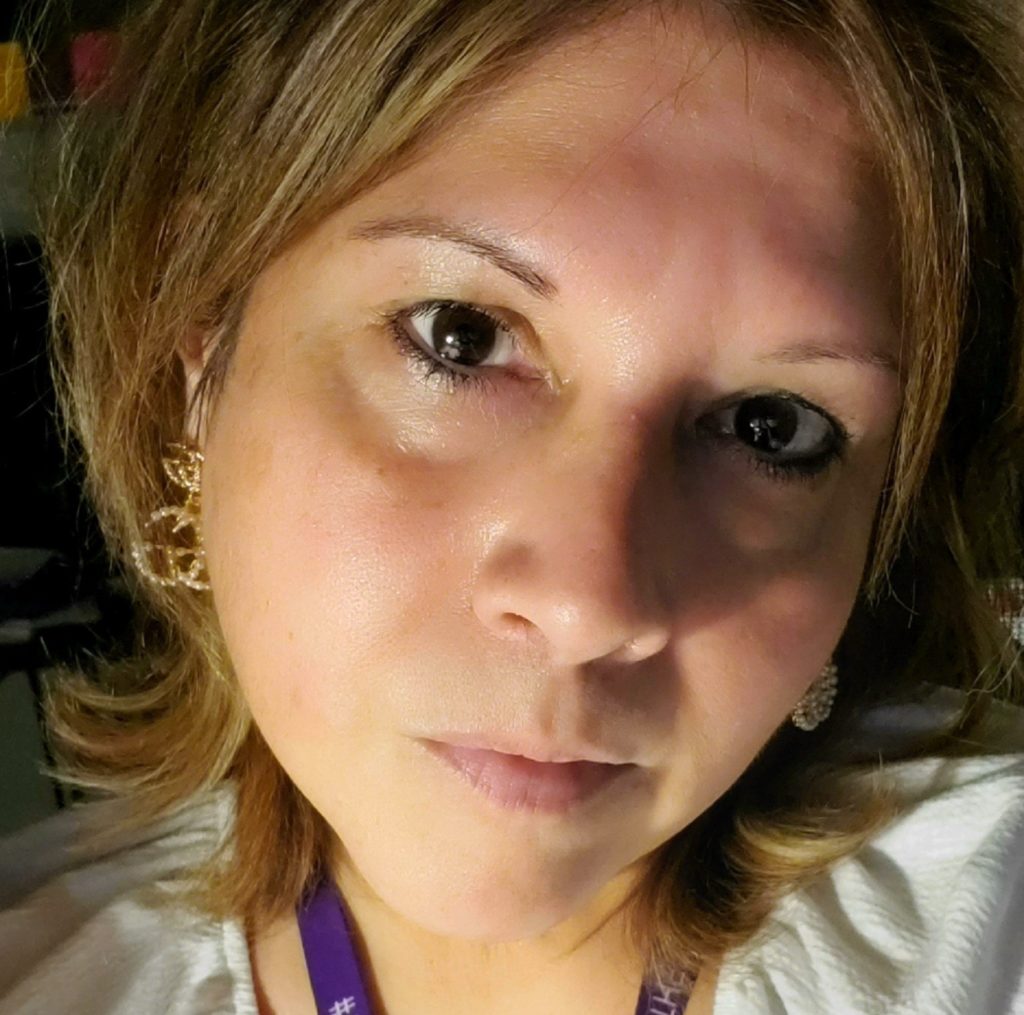
How do you identify with the Hispanic community?
You could consider me a mocha latte sort of brown. My Spanish speaking skills (or is it Spanglish?) aren’t strong, but I understand it well and can read it just fine. I don’t let that hinder me when I’m out and about en mi comunidad. While growing up in Central Texas, I earned mis estrellas doradas (my gold stars) by learning about mi cultura. There’s more about us than the Disney movie, Coco.
What do you admire most about Hispanic culture?
The traditions held by Hispanic families that are passed down from generation to generation are what I admire most. It is important that they continue so that our culture is not lost and forgotten. It is easy in these busy and disconnected times to forget to tell the next generation about things that they don’t even know to ask about. Everyone knows the stories about La Llorona and the Cucuy, but I’d like to make sure that the youth know about Sonia Sotomayer, Julian Castro, and Cesar Chavez, too.
What are some ways you celebrate your heritage?
I celebrate my heritage by looking for and attending theater productions or gallery showings that are written or created by Hispanic or Latino artists. I’m also drawn to literature written by Chicana authors. Unfortunately, there isn’t a lot out there. So, I’ll keep my fingers crossed that more will be published. Aye, I’ve always enjoyed writing so who knows, you might even find something that I’ve written on a bookshelf someday.
What advice would you give to our Hispanic/Latinx students?
As a parent, you always want your children to do better than you do. If a Hispanic/Latinx student has a dream or a goal, they should move toward them and push down barriers. Our Hispanic/Latinx students are just as smart as or smarter than any other group, and they can achieve greatness if they don’t allow themselves to be held back. Ponte las pilas (put in those batteries and get going), and don’t let anything stop you.
What is your biggest inspiration?
It isn’t what inspires me but what motivates me. Of course, my children and grandchildren motivate me most but it is also the youth of our community. They will lead the next generations, and we want to provide them with all the skills to do this best. They have so many hurdles ahead of them that past generations put out there. I want them to be successful and do better than we did.
What is your proudest achievement?
My biggest achievement is to still be working at ACC since starting back in January 1991. I’ve seen countless changes to the College and have had the fortune to work on campus as well as at the Highland Business Center. However, my biggest legacy would be the fact that I helped to launch our own celebrity, R.B. the Riverbat. You can’t say that they call me “Bat Mama” for nothing. I’ll make sure that “Bat Mama” fits somewhere on my tombstone or in my obituary.
How do you foster an inclusive environment?
Everyone is made differently, with varied edges, shapes, and colors. Individually we’re unique and beautiful, but when we all come together in unity, we’re stronger, bigger, and bolder. I feel that when we come together the fact that we are able to offer support and encouragement helps someone to succeed. Where someone might stumble and fall, there is someone else there to lend them a hand to get right back up.
Anything else you’d like to share?
A quote from Gloria E. Anzaldúa: To separate from my culture (as from my family) I had to feel competent enough on the outside and secure enough inside to live life on my own. Yet in leaving home I did not lose touch with my origins because lo Mexicano is in my system. I am a turtle, wherever I go I carry ‘home’ on my back.
Dr. Ruth Reinhart
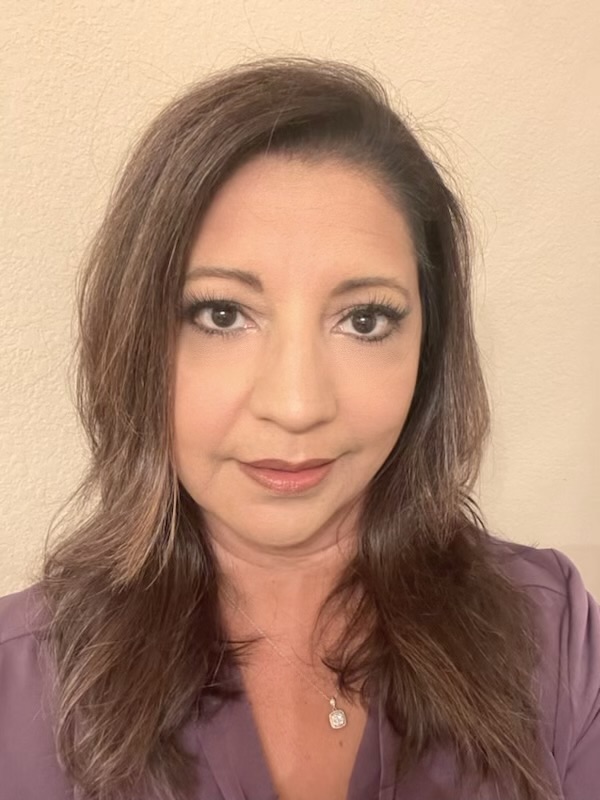
Since starting at ACC in 2006, Dr. Ruth Reinhart has held various roles at the college, including dean of student services at Riverside and South Austin campuses and professor/counselor at South Austin Campus. She has served as ACC’s Student Support Services associate vice chancellor since 2018.
How do you identify with the Hispanic community?
Although my ancestors were from Mexico, I identify as either Hispanic or Latina. I recognize that members of our Hispanic communities identify with various terms based on their family’s heritage, but feel that I can still connect with my Hispanic heritage/community regardless of their backgrounds.
What do you admire most about Hispanic culture?
Our Hispanic culture consists of so many things I admire, but I am most proud of how we are always willing to help each other, the importance of familia, and our strong work ethic. All these qualities are what make our Hispanic culture so rich and why I am proud to be a Latina.
What are some ways you celebrate your heritage?
Growing up in San Antonio, Texas, I was surrounded by my familia, and we loved to celebrate our Hispanic heritage by embracing cultural celebrations such as posadas, el Día de los Muertos, and quinceañeras. I still love sharing those traditions that are a part of who I am with my children and the next generations of my extended family. I love spending time with my extended family which allows us to continue sharing important Hispanic traditions. We enjoy cooking authentic Mexican food (tamales and menudo) and listening to music, mariachis, and, of course, dancing. Speaking Spanish is a very special way that I still connect to my cultural roots since both my maternal and paternal grandparents did not speak English. Therefore, learning Spanish was something that just happened. Today, I continue to embrace speaking Spanish, because it not only honors my ancestors but is a special way I connect with other Latinos.
What advice would you give to our Hispanic/Latinx students?
As a first-generation college student who had to navigate the college journey alone, I understand that college can be overwhelming. You might feel like you don’t belong because there might not be a lot of people who look like you in your classes. Don’t let that deter you. You do belong here and you can do this. Know that there are staff, faculty, and administrators at the college who are here to support and guide you — don’t be afraid to ask for help. We want to help you be successful. ACC has many student support services to help you be successful from the beginning of your educational journey — take advantage of them. I am not saying that it won’t be tough, but sí se puede, you can do it. Education is something that no one can take away from you, and it can open so many doors for you, as it has for me.
What is your biggest inspiration?
My mother, hands down! She sacrificed so much for me and my siblings. It’s unbelievable what she did for us. As a single mom with only a high school education, she accomplished so much in her life. She was a very strong and independent Latina who was not going to give up. She was going to prove to people that she could make something out of her life, and boy, did she. She instilled in us the importance of familia and having a strong work ethic. It is because of her that I am who I am today. Her consistent ability to overcome barriers demonstrated that life isn’t easy, but if you put your mind to it, you can accomplish anything. I know I wouldn’t be where I am today if it wasn’t because of my mother. I am eternally grateful for her unselfishness and the countless sacrifices she made in her life to make my life better. She will always be my hero.
What is your proudest achievement?
My proudest achievement is my family. My husband, Patrick, and I came from humble beginnings and have achieved so much in our 24 years of marriage. We both value the importance of education and decided to continue our educational journeys, each earning doctoral degrees. Patrick earned a Juris Doctorate (law) degree from the University of Texas at Austin, and I earned my doctorate degree in Community College Leadership at the Roueche Graduate Center at National American University. Our children had to sacrifice so much for us to accomplish our goals, but they did it with such understanding and love. I am proud that they understood the importance of education and the opportunities it would provide for our family.
How do you foster an inclusive environment?
The acceptance of different cultures, attitudes, and opinions is important to fostering an inclusive environment. I strongly believe that everyone is important regardless of their educational background, position, culture, etc. Getting to know individuals helps in understanding their perspectives and allows me to understand what they need to to feel included.
Luis Garza
Luis Garza is ACC’s Health Science retention coordinator and has been with the college since 2010.
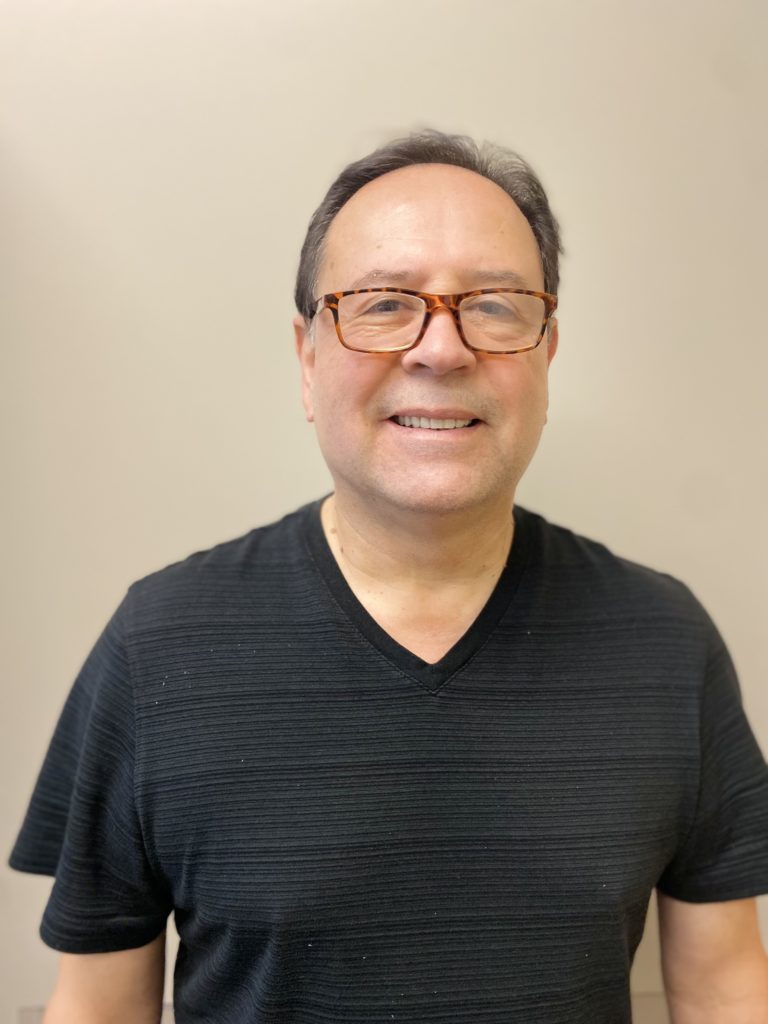
How do you identify with the Hispanic community?
I identify with the Hispanic Community on several levels. On one level, and the most basic, I was born to a family that’s Hispanic, so this was not by choice but by birth (with no regrets). On another level, language — I am very proud to say I can speak, read, and write the Spanish language, which is a tremendous advantage in communicating with others. On another level, culture — I am very proud of the Hispanic culture, with its deep roots and the historical impact my culture has had on this country’s history, not to mention the origins rooted in Mexican history. On another level, ethnicity — feeling a part of a group bigger than the individual, that is both homogenous and yet independent and unique, with its mores, traditions, holidays, cuisine. Another level, culture — which is different, vibrant, rich, traditional (old-fashioned) yet modern given today’s world and its expectations of our young people.
What do you admire most about Hispanic culture?
I cannot state just one thing that I admire about the Hispanic culture, that would be to dismiss everything that makes up this beautiful, exotic, rich, vibrant, foundation that identifies and nurtures those who identify with it. For me, it is my bedrock that makes me who I am.
What are some ways you celebrate your heritage?
I celebrate my heritage by enjoying the different holidays we get to experience within the Hispanic living experience. I also try to practice the values that were shared with me by my parents and grandparents and to pass that knowledge to my children and hope they will also continue to do so. I believe it is imperative that as Hispanics we continue to speak the language, pronounce our names as they are meant to be pronounced, and proudly live as a Hispanic.
What advice would you give to our Hispanic/Latinx students?
The advice I would heartily, enthusiastically, and as forcefully as I can give to Hispanic/Latinx students is NOW IS YOUR TIME! I would add, WHY NOT YOU, WHY NOT NOW, and if you’re not going to help me GET OUT OF THE WAY I’M COMING THROUGH!
What is your biggest inspiration?
My biggest inspiration is to be a part of a process that is continuing to help our next generation create themselves, to prepare them for the world they will be entering, able and capable of making a difference, of establishing a legacy for the generation coming behind them. Being part of this process makes me feel that although at some point I will be gone physically but very much alive vicariously through Hispanic student success.
What is your proudest achievement?
My proudest achievement is, and has always been, that I was able to overcome prejudice, discrimination, low expectations from others, and institutional lack of support and guidance to get an education with the opportunity to pay it forward. This is why I am able to feel affirmed and validated every day I come to work and assist students with the many challenges they may be facing.
How do you foster an inclusive environment?
I foster an inclusive environment by treating ALL people as one, with the mindset that we ALL have a contribution to make. I welcome diversity, which I consider the flavor and spice of our shared experience, sharing pain, loss, victories, and success. When one succeeds we all succeed, when one hurts we all hurt.
Inelia Caimanque
Inelia Caimanque is ACC’s staff development coordinator in the Human Resources Department.
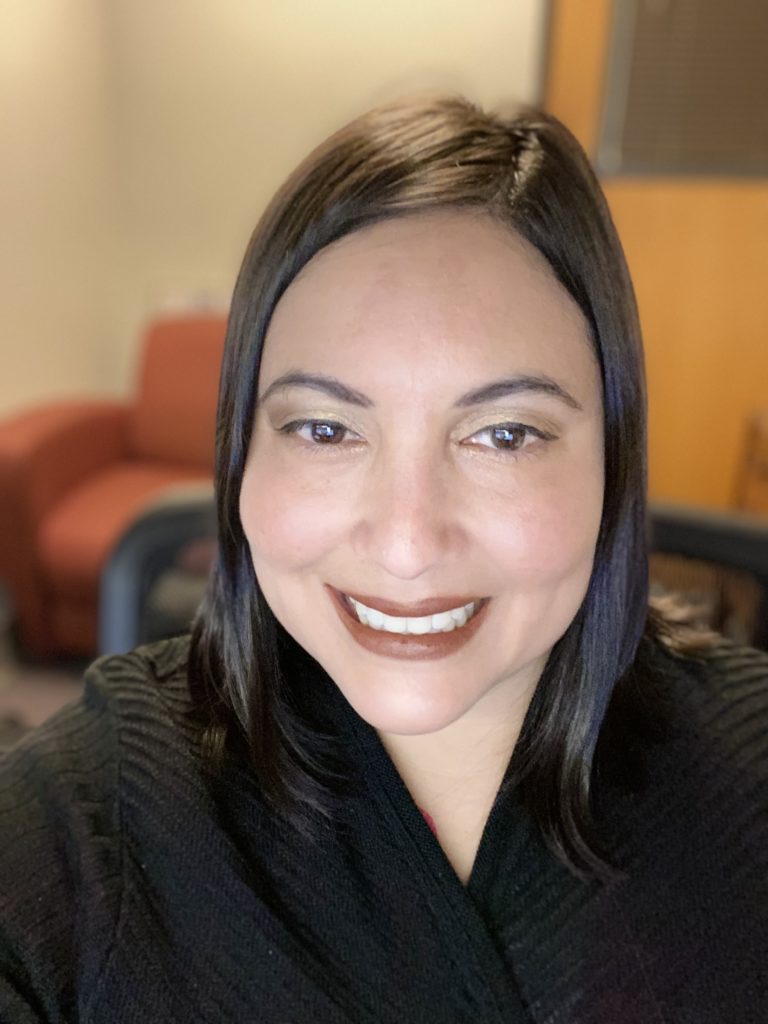
How do you identify with the Hispanic community?
There are so many facets of Hispanidad or Latinidad. For me, it’s all about the sights, the sounds, the senses. All the beautiful cultural celebrations and traditions we have, surrounded by loved ones and delicious food. There is nothing like an outdoor family gathering — embroidered dresses swinging to the Kumbia Kings blaring in the background, their flowing, vibrant colors straight out of a Frida Kahlo painting. Catching up with loved ones over chicken enchiladas topped with spicy salsa or fresh pozole with a side of homemade tortillas. Meeting family friends for the first time and feeling like you’ve known them since childhood. That sense of community you can only get when surrounded by the people you love that see you as the best version of yourself every single day. The uniqueness yet simplicity of it. This is home.
What do you admire most about Hispanic culture?
Hispanic culture is as diverse as its people. We hail from multiple countries with varying traditions and rich cultural backgrounds. It’s a beautiful thing to learn about each other’s roots.
What are some ways you celebrate your heritage?
I continuously seek out information about my ancestors and their lives to better understand myself. I participate in as many celebrations and cultural events as I can, always partaking in the food and festivities. Festival Cervantino in Guanajuato, Mexico, is one of the best multicultural events I’ve gone to. It features music, theater, visual art, films, dance events, and more from some of the Mexican states as well as other foreign countries or regions as “special guests” to showcase different aspects of their culture. And I especially love our music! You can typically find me humming or singing along to that song, the one we all know that you instantly break out singing or dancing along to, like “Baila Esta Cumbia” by Selena.
What advice would you give to our Hispanic/Latinx students?
Your Latinidad or Hispanidad is enough. You are enough. You are part of the culture whether you can speak perfect Spanish or only know a few words. There is no measure that can tell you what a “real” Latinx person looks like. Grant yourself permission to fully explore your culture and engage in learning about your origins. Don’t just let others tell you parts of a story they want you to learn about Latinx culture, learn about and create your own story.
What is your biggest inspiration?
My parents are my biggest inspiration. My dad left his country (Chile) at the height of the Pinochet dictatorship to make a better life for himself. My mom worked multiple jobs in Mexico to support my grandmother and her siblings after the sudden loss of her father. The sacrifices they made for their families and for my siblings and me to have better opportunities are not only admirable but life-changing. I’ve had a better life because of all of their sacrifices and hard work. I am so grateful for them.
What is your proudest achievement?
My proudest achievement is not a single moment, but a series of events and investments in people where I’ve been able to help others achieve beyond what they thought they were capable of. One example that comes to mind is when I worked as a trainer at Criss Cole Rehab Center for Blind Adults. Most who walked into this residential facility were people of color. They didn’t realize they had a progressive eye condition that could lead to blindness, because they didn’t have access to affordable healthcare, among many other factors.
I can remember the devastation and grief-stricken faces of my students as these beautiful people mourned their previous lives, now having to figure out a way to move forward after the loss of their sight. We instructed them with care and compassion, and they discovered new ways to persevere. It was beautiful to see the transformation of utter loss transition into a renewed sense of hope and belonging. My work and sacrifice live within them and their stories, and I am humbled to have been a small part of their transformation.
How do you foster an inclusive environment?
I think in order to be inclusive you have to check your own biases. It all starts with each of us. It’s important to confront the stories and stereotypes we’ve bought into. We must strive to educate ourselves and let go of ego. It’s also important to engage in discussions and seek information from those with varying perspectives and experiences you might not have considered when forming your own opinions. Varying opinions, perspectives, and life experiences can co-exist if we give them space to do so. It is imperative that we provide inclusive learning spaces and continue to look for opportunities to do better.

